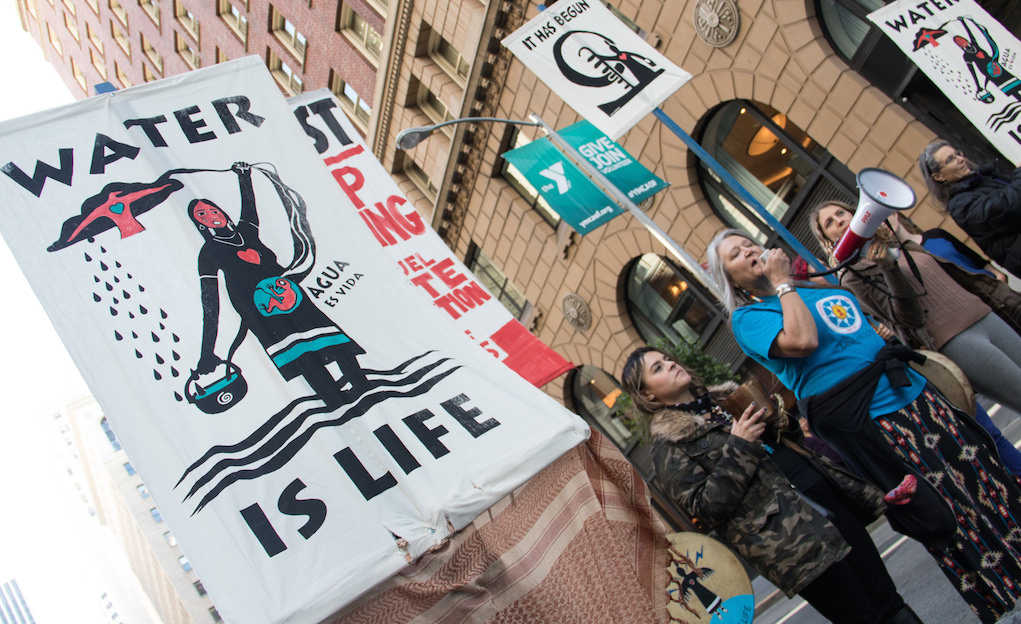Last month, I gave a keynote presentation called “Come Hell or High Water: The Water Justice Movement’s Fight Against Commodificaton and Extractivism.” The presentation was part of the Institute of Political Economy’s 20th Annual Grad Conference at Carleton University.
The conference theme was “Perspectives of Power,” and speakers where asked to grapple with questions like: how is power manufactured and deployed? How is power contested, transformed and embodied?Panel topics included labour, (de)colonization, inequality and food.
This blog is part one of a three-part blog series based on my presentation at this conference. This part includes an overview of the water justice movement in Canada and the ways in which power is manufactured and deployed in water governance.
Water is a cross-cutting issue among many social movements in Canada and in Indigenous nations. The water justicement movement here is diverse and includes grassroots groups, individual activists, Indigenous nations and groups, environmental and labour organizations, scientists, workers and many others.
They work on broad range of issues including calling for justice in the face of drinking water advisories in First Nations communities, Nestlé and other bottled water takings, oil and gas drilling, pipelines, mining, fracking and liquefied natural gas (LNG), public-private partnerships, nuclear waste and other threats. There are also localized movements fighting mega quarries, logging and so much more.
The various struggles within the water justice movement overlap at times. The underlying messages and principles throughout all of these fights are often “water is life,” “water is sacred,” “water is not for sale” and “water is a human right.”
The Water Is Life Alliance is an alliance across the Great Lakes Basin and includes groups and activists in Ontario and Michigan. The group initially came together to fight Nestlé’s water grabs in Ontario and Michigan and then began connecting the dots to the water cutoffs in Detroit, the lead poisoning of water in Flint, the lack of clean drinking water in First Nations communities and other water issues like fracking and water privatization.
There are a number of ways corporations and governments reinforce and advance neoliberal policies that promote extractivism and the commodification of water. These policies create injustices and violate the human right to water and Indigenous water rights.
Power is manufactured and deployed through:
- The creation of laws or policies: For example, Bill C-69 which includes the Canadian Navigable Waters Act, has significant impacts on water, yet fails to obtain free, prior and informed consent from Indigenous nations, cutting many out from decision-making processes.
- Policing and criminalization of dissent: There are a lot of examples where governments and police criminalize Indigenous peoples and settler activists for defending lands and waters such as the Line 9 pipeline, the Trans Mountain pipeline, fracking in Elsipogtog First Nation and the raid on Wet’suwet’en territory earlier this year, and protect corporate interests instead.
- Land or property: Whether land is designated Crown land, private property or recognized as Indigenous territory gives some people power and leaves others out of decision making.
- Messaging, language and framing particularly in the media: Messaging can be based on false assumptions. For example, messages like “the fossil fuel industry is the only way to create jobs” or “pipelines, fracking and bottling water are good for the economy” are based on the false assumption that the current capitalist economy is good for everyone.
- Knowledge and access to information: Public-private partnerships are often kept secret — like in the case of Winnipeg — and that inhibits a community’s ability to engage in genuine democratic debate.
Stay tuned for part two of this blog series which will give a summary of key water issues in Canada and how communities are contesting the power of corporations, governments and economic elites. To watch a recording of my presentation at the Perspectives of Power conference in February 2019, click here.
Emma Lui is an activist, a writer and a contributor to the book, Corporatizing Canada: Making Business out of Public Service.
Photo: Peg Hunter/Flickr
Help make rabble sustainable. Please consider supporting our work with a monthly donation. Support rabble.ca today for as little as $1 per month!





